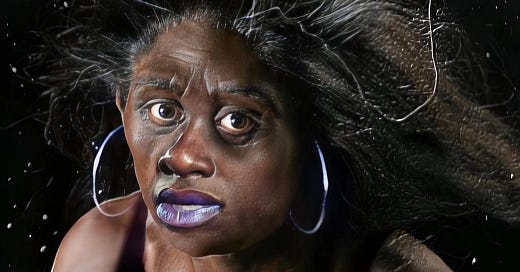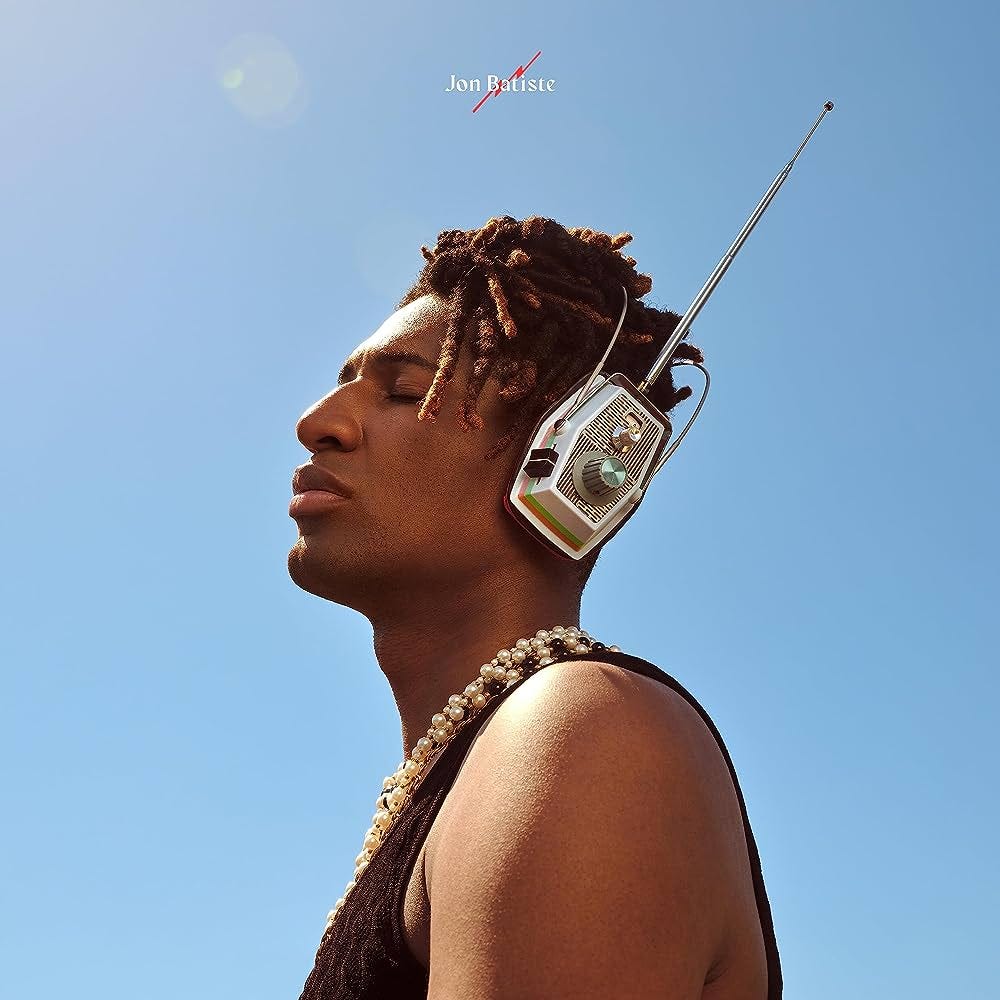Adventures in Listening, August 17, 2023: I'm Problematic, Too
While the restless rapper Noname questions what it means to live justly, maestro Jon Batiste seeks unity and uplift. Plus, new songs from Peter Gabriel and Olivia Rodrigo.
Noname - Sundial
Back in 1989, Bob Dylan offered a blunt diagnosis of a culture that had lost its moral bearings: “They’re breaking down the distance between right and wrong.” That distance feels shorter than ever on Sundial, the arresting new record from Chicago rapper Noname. Across its 32 minutes of withering social critique and unflinching self-inventory, the artist laments the extent to which our gatekeepers, our exemplars, the people we’re supposed to trust to lead us in righteous witness lose their way in hypocrisy and contradiction. Early in the record, Noname takes shots at all the rappers who are “drifting in and out of consciousness,” a sharp rejoinder to her scene’s complicated attitudes toward social responsibility— and then, almost as an afterthought, she admits that “she a rapper, too,” refusing to acquit herself or evade moral scrutiny. And that’s just for starters: Before the album ends, Noname lambasts Barack Obama for drone warfare that caused harm to brown-skinned people, and calls out Beyonce, Kendrick, and Jay Z for their support of the NFL’s rampant criminality and materialism. It seems as though she is acutely troubled by how the Black community’s voices of moral accountability topple under their own lofty scruples, and indeed, by the contradictions inherit to the African-American experience itself: On “Hold Me Down” she notes how easy it is to denounce colonialism yet how hard to reckon with abusive practices among the colonized. Let it never be said that Noname herself is unwilling to do the hard work of moral seriousness, nor to stray away from big questions. I think the big question at the heart of Sundial is basically this: What if we’re all just full of shit?
If I’m making it sound like Sundial is scolding or shrill, perish the thought. Along with Billy Woods’ Maps, Sundial ranks among the most thrilling hip-hop albums in recent memory, and Noname as one of our most riveting rappers. A thoroughly modern performer with an old-school sensibility, she eschews the mumbled melodies of the Rap Caviar era in favor of nimble linguistic gymnastics; like fellow Chicagoan Jamila Woods she bears the crisp, clear delivery of a spoken word poet, and like GOAT-candidate Black Thought she revels in bouncing alliterations, enjambments, and metaphorical flights of fancy off of each other, her words offering one tongue-twister after another without ever losing their narrative throughlines. (Try this three times fast: “Smoking my crackpot, ready to foxtrot, beatbox and kick rocks, really, kick rocks!”) The tracks are all constructed from rumbling pianos, walking bass, gospel choirs, and bright keyboard motifs, occupying the same cheerful aesthetic as her previous albums, or Coloring Book-era Chance the Rapper. And now as ever, the formative influence of A Tribe Called Quest looms large.
Her raps are notable not just for their skillful delivery but for their at-times shocking content— it feels genuinely transgressive to hear anyone, in the year of our Lord 2023, adopt a mocking sing-song tone in order to put Beyonce on blast. And yet, Sundial isn’t interested in provocation for its own sake. Rather, the intent seems to be exposing the multi-layered complications inherent to acting justly in a fractured world. The complications are felt most acutely by those who are earnestly trying to do good: In “Beauty Shop,” Noname is paralyzed by the realization that supporting a Black business may also mean surrendering to damaging stereotypes of feminine beauty. Meanwhile, “Balloons” problematizes the nature of songwriting itself, finding Noname torn between a desire to express her personal trauma and revulsion at the idea of fetishizing or commercializing it. If Sundial demonstrates anything it’s that the demands of living justly— certainly as we’ve defined it in our culture— are too great for anyone to bear. (The artist may have inadvertently proven her own point by inviting Jay Electronica to contribute a ruthless verse to the end of “Balloons,” his presence on the album sparking an outcry due to his antisemitic associations; Noname has refused calls to apologize.)
In her incisive rendering of this lofty burden, and our collective trend toward hypocrisy, she’s offered us a good, prophetic word; she has shown us what it means to hunger and thirst for righteousness with a palpable fervor. What Sundial cries out for is atonement, absolution, forgiveness, sanctification; someone who can lift the burden for us. Maybe it’s a foregone conclusion that we’re all full of shit— in which case, the biggest question might be this: Who is worthy to be called good?
Jon Batiste - World Music Radio
Leave it to Jon Batiste to make a big swing like this— following his surprise Album of the Year Grammy with a deliberate attempt at a big-tent, centrist pop blockbuster. Complicating things further, it’s structured as a late-night radio broadcast, and it invites a pan-cultural supporting cast that includes everyone from Lana Del Rey to Lil Wayne, K-pop stars to Catalonian balladeers. That the album is largely successful is a testament to Batiste’s considerable charisma, his sprawling ambition, and his unerring ear for hooks.
I wrote a much longer piece about World Music Radio over at FLOOD Magazine. For the tl;dr crowd, I’ll just say that it’s good, wholesome fun, at least as good as We Are, and will likely be one of the more enterprising pop records we get all year.
Olivia Rodrigo - “bad idea right?”
I remain deeply delighted at the thought that Olivia Rodrigo has effectively introduced an entire generation to the electric guitar— and that the spirit of 90s alt-rock is being kept alive by someone who wasn’t even born until two years after Bill Clinton left office. Certainly, those of us who are old enough to remember hearing No Doubt played over supermarket loudspeakers and Sheryl Crow burning up the radio will find plenty of reference points on “bad idea right?,” the rambunctious second single to tease Rodrigo’s upcoming Guts. But this isn’t just geriatric millenial cosplay: As ever, Rodrigo sounds totally present and fully engaged with her unique skill set— namely her withering emotional acuity, her deft and often hilarious deployment of curse words, and her ability to be self-effacing without stumbling into self-loathing.
Peter Gabriel - Selected songs from i/o
The last time Peter Gabriel released a new album of original material, Olivia Rodrigo was approximately seven months old. Most of us have made peace with the reality that Gabriel is, for all intents and purposes, retired from making pop records, a vocation that he’s seemed a little uneasy about ever since 1992’s Us. But actually, he’s quietly been releasing singles all year long, putting out a new song at the start of each new lunar cycle, ostensibly heralding the release of his long-awaited i/o at the end of the year or the beginning of next. In other words, about half of a new Peter Gabriel record is currently out in the world, available for sampling on the streaming service of your choice. To complain that nothing in this batch of songs feels as vital as “Sledgehammer,” “In Your Eyes,” or “Mercy Street” would obviously be ridiculous and unreasonable. What impresses me about them is that they feel so easygoing and light, never sounding as fussed-over as you might assume for music so long in gestation. And while the i/o sampler downplays Gabriel’s love of African and Middle Eastern music, most of his other hallmarks are on full display— including a voice that sounds undiminished, and a continued propensity for dusky piano ballads and surging pop anthems in equal measure.






